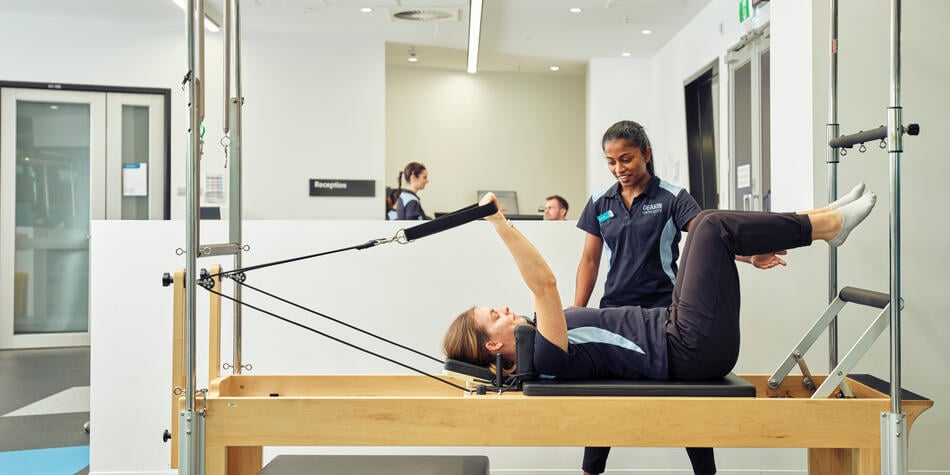Studying a Master of Clinical Exercise Physiology at Deakin opens many professional pathways, including going on to conduct leading sports science research. Meet two of our graduates and find out how their research is paving the way forward for better health outcomes. This is part one of a two-part series.
Exercise science research is a constantly evolving area as we gradually learn more about the human body, rehabilitation and exercise interventions. After completing a Master of Clinical Exercise Physiology (MCEP), you might choose to pursue a hands-on clinical role, academic research, or blend the two. We chatted to two of our graduates to hear how the MCEP started them on the road to becoming a researcher and find out more about how they’re changing lives.
Dr Steve Foulkes: Exercise interventions for cancer patients
Dr Steve Foulkes is an Accredited Exercise Physiologist and Postdoctoral Research Fellow at the Baker Heart and Diabetes Institute and the University of Alberta, Canada. Before starting his PhD, Steve studied both an undergraduate degree in exercise science and the MCEP at Deakin.
Steve has been awarded the Exercise and Sports Science Australia Medal for Best PhD Thesis for his work on exercise for preventing chemotherapy-induced cardiotoxicity and exercise intolerance, which was published in top-tier cardiology journal Circulation. He’ll present that work at the American Heart Association meeting and hopes it will go on to influence guidelines and best practice for cancer recovery.
Steve is particularly interested in examining the impact of exercise for improving heart health of cancer survivors, many of whom suffer cardiovascular consequences from cancer treatment.
'We know exercise is good for heart health in other contexts and we're applying that to cancer survivors,' says Steve.
'A lot of the cancer treatment that basically saves [a cancer survivor’s] life by killing the cancer also can damage their heart… this means that while they might theoretically be able to live the rest of their life cancer free, they might lose something like five or 10 years of healthy life due to the cardiovascular consequences of cancer treatment.'
Steve’s research is yielding exciting results, some of which he didn’t anticipate.
'We as scientists think, "Oh, you've got to exercise because it's important for your heart". But I think what's more important to the patients is the day to day… some of the stories that came through were that exercise was something that could actually help them take control of their illness.
'Everything else is an oncologist giving you toxic drugs while you’re sitting in a chair… this is something that you’re actually going out and doing to keep yourself fit and healthy during therapy.'
His research has taken him to Canada, where he’s extending his initial findings by investigating the heart health of women who have been treated for breast cancer a number of years ago.
I always look back on my experience at Deakin fondly and seeing how it led me down this sort of path. I think when I was going through the MCEP, it became clear how important it was to highlight that link between exercise physiology and health outcomes.
Dr Steve Foulkes
Accredited Exercise Physiologist and Postdoctoral Research Fellow at the Baker Heart and Diabetes Institute and the University of Alberta
Dr Daniel Van Den Hoek: Sports performance through strength sports and powerlifting
Dr Daniel Van Den Hoek is based at the University of the Sunshine Coast. After completing both his Bachelor of Exercise Sports Science and MCEP at Deakin, Dan pursued his PhD into psychosocial and mental health for women with obesity undergoing weight loss incorporating exercise.
'In the end, I ended up spending almost 10 years at Deakin as a student and then was a staff member for portions of that as well,' says Dan.
'I was in the second cohort of the MCEP and we were a cohort of about 20-odd. You couldn't feel more supported by the staff. They're all now colleagues as I work in higher education as well, but some are also close friends.'
On top of his core research into powerlifting, and prior to Dan moving to the University of the Sunshine Coast, he was the course and practicum coordinator for the clinical exercise physiology degree at Australian Catholic University (ACU) in Brisbane. He also supervises PhD students at ACU.
'I'm supervising a PhD student now who's looking at the effects of exercise in transition from the Australian Defence Force. What we're doing is something entirely new, which is using exercise as an addendum to the transition support provided by the Department of Veterans’ Affairs. From what we can tell, nobody else has ever done that in the world and we think we can make a real difference, especially given the incidents of veteran suicide and depression at the moment.'
That's something I'm really proud of that we're actually really going to make a difference in the world using exercise.
Ready to kickstart your career in sports science research and exercise physiology?
Learn how Deakin can get you there with a Master of Clinical Exercise Physiology.

